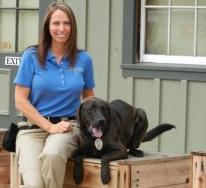 By California Dept. of Food and Agriculture
By California Dept. of Food and Agriculture
Dozer the detector dog has reported for duty! He brings our total to 13 dogs throughout the state that spend their working hours sniffing around package-delivery facilities, detecting parcels that contain fruits, vegetables, plants and other agricultural materials. These dogs protect California’s citizens and its agriculture from harmful pests, diseases and weeds that could otherwise sneak into our state and cause dangerous and expensive infestations and outbreaks.
Dozer, a three-year-old Labrador retriever mix, came to us from Atlanta Lab Rescue. All of the dogs in the California Agriculture Detector Dog Program are rescued dogs. Dozer arrived in California earlier this month to begin his assignment with his handler, Jennifer Berger with the Sacramento County Agricultural Commissioner’s Office. He works at various shipping facilities in the Sacramento Valley area.
Jennifer reports that Dozer is a remarkably strong and determined dog who loves to chew on a big Nylabone as they ride to work. When he’s off the clock, he likes to tug on his “Kong Wubba” toy and fetch a ball.
The state’s program currently consists of 13 dog-handler teams in nine counties; Alameda (one team), Contra Costa County (two teams), Fresno (one team), Los Angeles (two teams), Sacramento (one team), San Bernardino (two teams), San Diego (two teams), San Joaquin (one team) and Santa Clara County (one team). The teams also travel to neighboring counties to cover additional areas. Photos of the other dogs as well as our video “The Nose Knows” are available online at http://www.cdfa.ca.gov/plant/dogteams/index.html. The program is a cooperative effort between the United States Department of Agriculture, the California Department of Food and Agriculture and the County Agricultural Commissioners and Sealers Association.
Since the program began in 2006, the dog teams have intercepted thousands of mislabeled or otherwise illegal packages, including shipments containing more than 360 actionable insect and weed pests. A few of their significant interceptions are:
— Asian citrus psyllid (ACP) infected with huanglongbing (AKA citrus greening), found in unmarked luggage originating in India; huanglongbing is considered the world’s most devastating citrus disease.
— Japanese beetle, found in packing material inside a parcel originating from Arkansas; this pest damages the foliage, flowers or fruits of more than 300 different ornamental and agricultural plants.
— Burrowing nematode, found in root samples collected from unmarked trees originating in Florida; this pest is a parasite of the roots of fruit trees, vegetable plants and other crops.
Disclaimer: Articles featured on Oregon Report are the creation, responsibility and opinion of the authoring individual or organization which is featured at the top of every article.

